#L'Homme Paris
Text
The Iron Lady & The Human Rights Square, Paris.
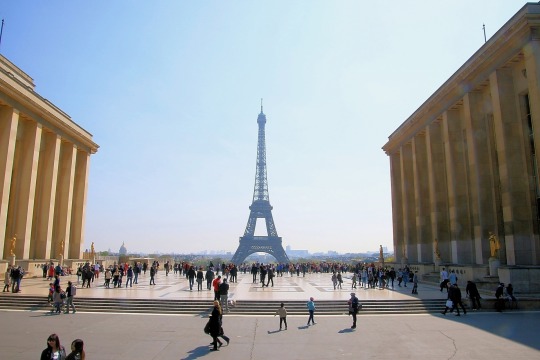
#La Dame de Fer#Architecture#Trocadero#Palais de Chaillot#Eiffel Tower#Wrought Iron#Lattice Tower#Parvis des Droits de l'Homme#Musee de l'Homme#French Moments#Paris#France
58 notes
·
View notes
Text
Sexiest Hugo characters: survey results
1. enjolras [les miserables]
2. esmeralda [notre dame de paris]
3. montparnasse [les miserables]
4. djali [notre dame de paris]
5. gwynplaine [l’homme qui rit]
6. la pieuvre [the toilers of the sea]
7. cimourdain [93]
8. bahorel [les miserables]
9. gilliatt [the toilers of the sea]
10. javert [les miserables]
11. hernani [hernani]
12. phoebus [notre dame de paris]
13. gauvain [93]
14. feuilly [les miserables]
15. courfeyrac [les miserables]
16. josiana [l’homme qui rit]
17. marius pontmercy [les miserables]
18. don carlos [hernani]
19. dea [l’homme qui rit]
20. combeferre [les miserables]
21. homo [l’homme qui rit]
22. cosette [les miserables]
23. fantine [les miserables]
24. bishop myriel [les miserables]
25. valjean [les miserables]
26. don ruy gomez de silva [hernani]
27. grantaire [les miserables]
28. claquesous/le cabuc [les miserables]
29. dona sol de silva [hernani]
30. jehan frollo [notre dame de paris]
31. ursus [l’homme qui rit]
32. eponine [les miserables]
33. prouvaire [les miserables]
34. claude frollo [notre dame de paris]
35. joly [les miserables]
36. ebenezer caudray [the toilers of the sea]
37. houzarde [93]
38. fleur de lys [notre dame de paris]
39. sister simplice [les miserables]
40. pierre gringoire [notre dame de paris]
41. fauchelevent [les miserables]
42. clopin [notre dame de paris]
43. bossuet [les miserables]
44. michelle flecharde [93]
45. david dirry-moir [l’homme qui rit]
46. radoub [93]
47. mabeuf [les miserables]
48. col pontmercy [les miserables]
49. fibi [l’homme qui rit]
50. azelma [les miserables]
51. quasimodo [notre dame de paris]
52. barkilphedro [l’homme qui rit]
53. hardquanonne [l’homme qui rit]
54. babet [les miserables]
55. vinos [l’homme qui rit]
56. gillenormand [les miserables]
57. thenardier [les miserables]
58. deruchette [the toilers of the sea]
59. lethierry [the toilers of the sea]
60. mme thenardier [les miserables]
61. gudule [notre dame de paris]
62. lantenac [93]
63. mlle baptistine [les miserables]
64. clubin [the toilers of the sea]
if i mispelled anything no i didnt
if you disagree with where your favs are, i’ll be holding a bracket soon! so look forward to boosting them with your votes
#Victor Hugo#hugo sexy election#les miserables#les mis#quatre-vingt treize#ninety three#notre dame de paris#the hunchback of notre dame#l'homme qui rit#the man who laughs#the toilers of the sea#les travaillers de la mer#hernani#thanks for voting yall!#pizza talk
102 notes
·
View notes
Text
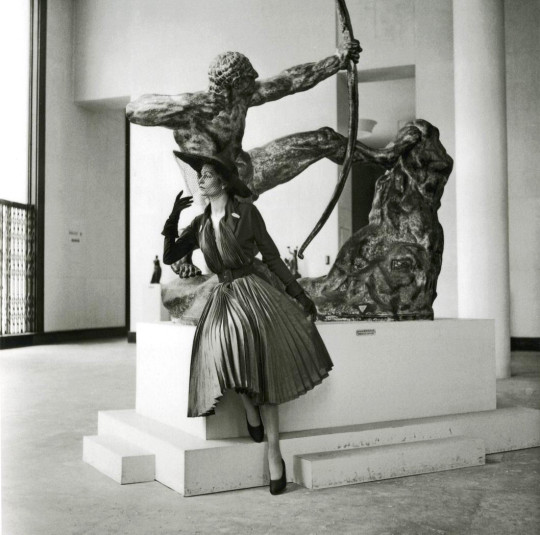

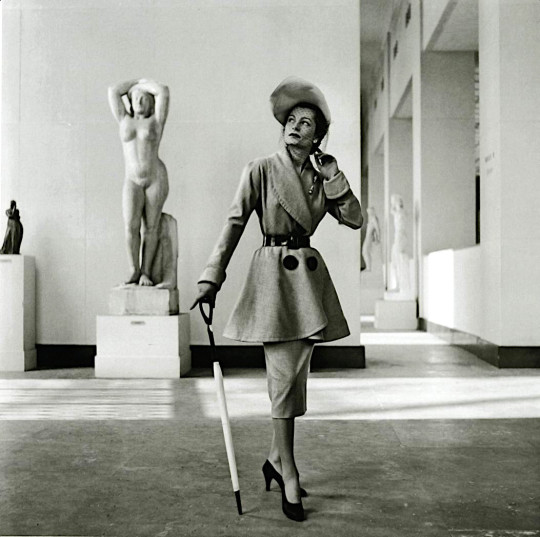
Creations of designer Jacques Fath, by the photographer Willy Maywald. ❤️❤️❤️❤️❤️
Musée de L'Homme Paris 1951
(top) Cocktail dress and hat.
(middle) evening gown.
(below) Day ensemble.
#jacques fath#french designer#haute couture#fashion 50s#paris#musée de l'homme#la mode#willy maywald#evening gown#day ensemble#cocktail dress
65 notes
·
View notes
Text


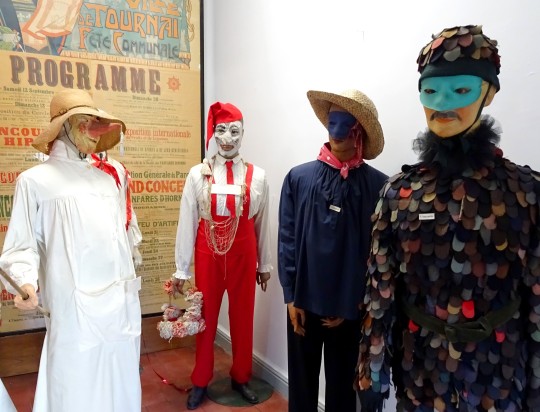
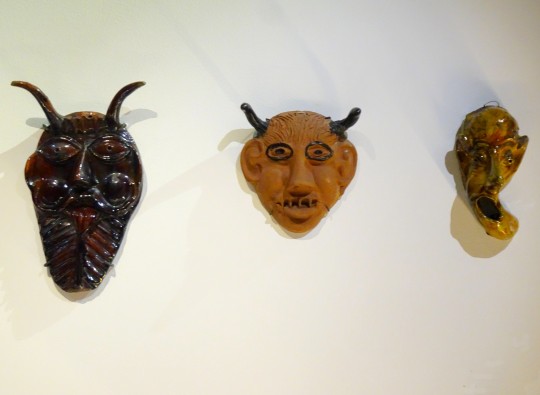
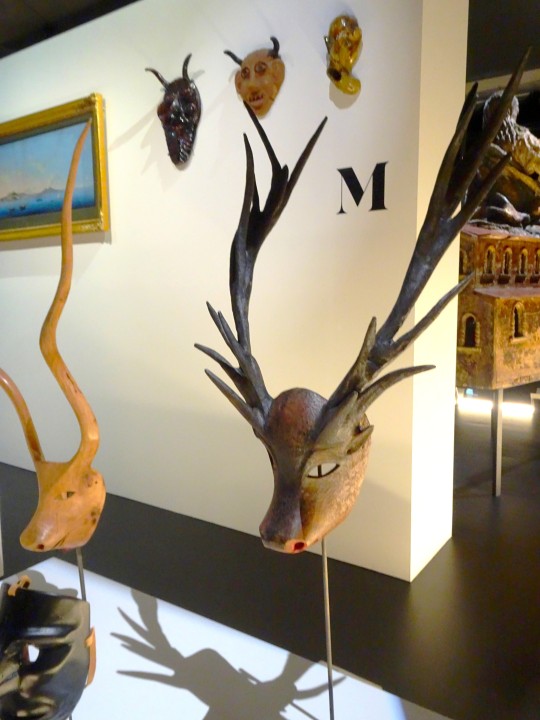

Carnaval !
Moi ! , derrière un masque acheté par mes parents en Catalogne, utilisé pour la Patum, de Berga
Paris, Musée de l'Homme - carnaval de l'Europe de l'Est
Tournai, Musée du Folklore
Marseille, MuCEM, expo Une Autre Italie - masques contre le mauvais œil - Calabre, 1970
idem : masque de Boé et de cerf - Sardaigne
idem : masque de carnaval - Val d'Aoste, début XXe s.
#carnaval#déguisement#masque#doua#moustache#patum#berga#catalogne#espagne#paris#musée de l'homme#belgique#wallonie#tournai#musée du folklore#calabre#italie#cerf#boé#mauvais oeil#val d'aoste
6 notes
·
View notes
Text
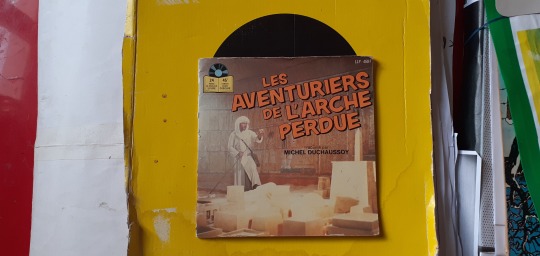
Tout part d’un 45 tours. Avec des nazis, des indiens d’Amazonie, un archéologue qui porte le nom du chien de son père, une amoureuse aux confins du Népal. Cet homme a un fouet, fouet qui a peut-être appartenu à Zorro, cet homme est sans doute une copie de Tintin voire un alter ego de L’homme de Rio. Plus tard on entend Elvis au loin, ça vient d’Hawaï via satellite.
#audio blog#radio#psy#paris#adamant#psychothérapie institutionnelle#45#tintin#zorro#l'homme de Rio#Népal
3 notes
·
View notes
Text
I think takahiro arai should do more Victor Hugo manga adaptations, you know as a treat. Just imagining that version of Notre dame or the man who laughs...
#takahiro arai#les mis manga#victor hugo#notre dame the paris#the man who laughs#l'homme qui rit#les Miserables#the hunchback of notre dame#speaking of notre dame i did have part 1 of a graphic novel adaptation#should maybe search for the rest
2 notes
·
View notes
Text
Au salon de l'auto, un badaud regarde une belle voiture. Un vendeur l'aborde :
- Elle a l'air de vous plaire cette voiture, monsieur!
- Oui, c'est vrai, elle me plait beaucoup. Mais elle n'est pas pour mon budget, loin s'en faut!
- Sachez, monsieur, que nous avons toujours des solutions de financement pour les personnes sympathiques comme vous.
- Peut-être, mais je connais ma femme, elle ne voudra jamais.
- Ecoutez, monsieur, dites à votre femme que pour les échéances, il n'y a pas de problème. Mais dites-lui surtout qu'avec ce modèle, en partant de Paris à 22 heures, vous arrivez à Marseille à 2 heures du matin!
Le lendemain, l'homme revient au stand.
- Alors, monsieur, vous avez parlé du financement à votre femme ?
- Oui, mais elle m'a répondu qu'elle n'avait pas confiance.
- Lui avez-vous dit qu'en 4 heures, vous êtes à Marseille ?
- Oui, elle m'a répondu " qu'est-ce que tu veux qu'on aille foutre à Marseille à 2 heures du matin.
#Au salon de l'auto#- Elle a l'air de vous plaire cette voiture#monsieur!#- Oui#c'est vrai#loin s'en faut!#- Sachez#monsieur#- Peut-être#mais je connais ma femme#elle ne voudra jamais.#- Ecoutez#dites à votre femme que pour les échéances#en partant de Paris à 22 heures#vous arrivez à Marseille à 2 heures du matin!#Le lendemain#l'homme revient au stand.#- Alors#vous avez parlé du financement à votre femme ?#mais elle m'a répondu qu'elle n'avait pas confiance.#- Lui avez-vous dit qu'en 4 heures#vous êtes à Marseille ?
0 notes
Text

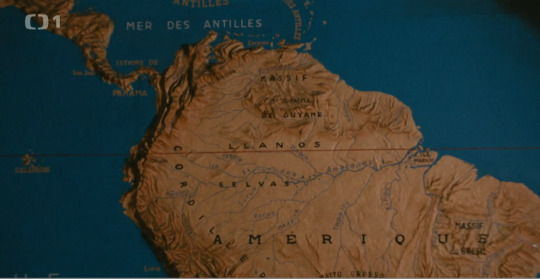

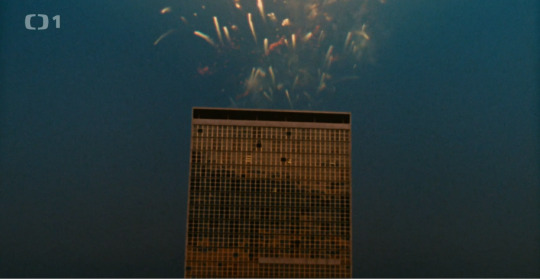

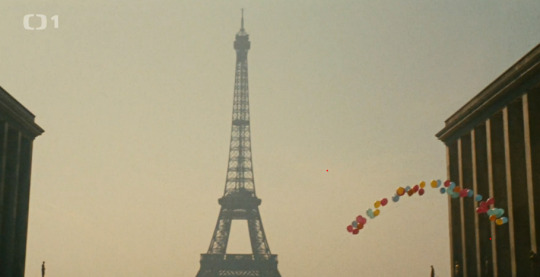

L'Homme de Rio (1964)
#L'Homme de Rio#french cinematography#jean paul belmondo#60s#1964#new wave#retro#brasil#rio de janeiro#brasilia#france#paris
1 note
·
View note
Text
When The World Is Free: Chapter 2 - La Valse de Paris
MASTERPOST
PREV | NEXT
Pairing: Benedict Bridgerton x fem!reader, WW2 AU.
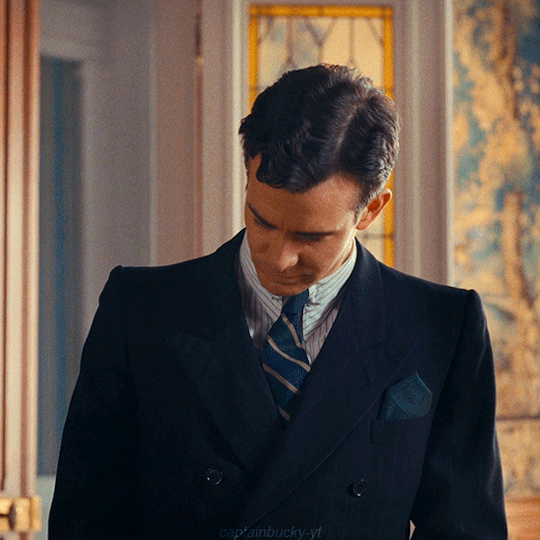

Warnings: none
Word Count: 1.7k
AuthorsNote: Chapter 2 of new multi-chapter fic based on a request by the lovely @amillcitygirl! Please see the masterpost for a synopsis of this story. This details our reader settling into Paris and the outbreak of war. Benedict turns up next chapter. Thanks to @colettebronte for beta reading. Enjoy! <3

Paris, September 1939
Your first few weeks in Paris are a delightful blur.
Spending late summer exploring the city - with Solène as your occasional guide and Eloise when she is not at work. You soak up every moment, from the windswept magnificence of standing atop the Eiffel Tower, your words being stolen by the wind, to the monastic silence of the Louvre on a quiet Monday morning. And everything in between - from Notre Dame's atmospheric incense-laden gothic darkness to the airy, resplendent glass dome of Galeries Lafayette that glitters like a prismatic jewel even on cloudy days.
But perhaps your favourites are the little slices of city life: sitting watching the world go by at a corner cafe, the crunch and warm, pillowy softness of the first bite of freshly baked baguette as you wander back from the boulangerie, the lingering fragrance of the rose garden at the Château de Bagatelle in Bois de Boulogne... It's all pieces of a puzzle that fill your heart in ways that make your life before now seem drab, almost in black and white, like a photograph.
You have written to Stanley once since you arrived, effusive in your praise, a homily to your new home, however temporary. While proclaiming his happiness for you, his response tempered, a touch dismissive of your wonderment. I can scarcely believe any city could truly live up to the praise you so readily heap upon Paris, my love, he wrote back. That was a week ago, and your urge to reply has been muted.
It's during an idle lunchtime by the Seine, eating a sandwich as you dangle your feet over the river wall, that you genuinely feel a local. An elderly French couple, likely visiting from the provinces, approaches you and asks you for directions to the Musée de l'Homme. Part of you aglow they think you sophisticated enough to look Parisian, and French. And you are able to help them, giving them the information in French, not fluent but sufficient that they are surprised when you confess “je suis américaine”.
In your third week, you secure the art gallery job Eloise had seen posted. An opportunity to meet many new people, primarily British and American, who share your love of art of all persuasions. You spend many a happy hour answering questions and building your knowledge of art, not just in your gallery but across the city. Part of you is wistful to study the subject in even greater depth than the books you borrow in copious quantities from the library where Eloise works.
You grow so close to Eloise so quickly that it’s as if you have known her your whole life. A sense of kinship, a near familial bond. You know, on some instinctive level, she will always be a part of your life somehow. Your evenings are often spent in lounge bars together—venues awash with art deco splendour as you listen to jazz through a cigarette haze and flirt aimlessly with a carousel of handsome men. Life seems so full of potential, a hum in your very being.
“What do you think the purpose of life is, y/n?” Eloise sighs as she flops onto your bed after returning from one such decadent night out.
“Aaaand we are done with the brandy…” you declare, taking the bottle of Martell cognac from her grip and placing it pointedly on the dresser, your high-handed point only mildly undermined by your own unsteady gait.
You collapse down next to her, the intricate ceiling rose around your light fixture swirling slightly before your very eyes.
“Love?” you hazard in answer to her question.
“Boo! Cliché!” she jeers, elbowing you good-naturedly.
“I don’t just mean romantic love,” you protest, “the love of family… friends…”
“Ah, yes, family. Endlessly large family. Don’t suppose you want an extra sibling or two, do you? I could be persuaded to let a couple go,” she squints comically.
“Depends… can I have the artist?” you jest.
“You have to stop staring at that painting; it's getting weird,” she opines with her typical bluntness, “and no, you can’t. You know he’s my favourite,” she pouts.
“I think he’s my favourite too,” you opine over a stifled yawn, any embarrassment about being called out for your unbridled admiration overridden by the sleepy state your comfortable bed lulls you into.
“If you end up being attracted to my brother, I will have to disown you, you know,” she pats your hand drowsily.
“Hmm, good thing he’s so far away…” you trail off with a lazy giggle, eyes drooping heavily.
It’s the last words you exchange before you both fall asleep on your bed.
–
Perhaps, as with all things that are too good, the idyll is temporary. It's the news you wake up to that following morning, September 4th, which throws everything into uncertainty. Solène knocks on your door early with an uncharacteristically sombre expression, wordlessly handing you the morning paper and flicking on the wireless on your mantelpiece, the fine lines on her face deeper etched, furrowed with worry.
‘La Guerre!’ the headline screams from the newspaper. And the voice on the airwaves, your ear more attuned to the language now, details how Britain and France have jointly declared war against Germany for their invasion of Poland a few days prior.
At the sound of the radio, Eloise emerges from your room, blinking and hair asunder, a little delicate from your previous night's revelry. You sip coffee at a loss for what to think or do. It’s an odd cognitive dissonance when life at once seems identical but also changed by an invisible shape - an undercurrent of fear, of the unknown, a punch to the pit of your stomach that you don’t know how to acknowledge - even as you go through the motions of your daily routine and head to work.
By the evening you are more phlegmatic about the situation. Your spirit dampened, yes, but not crushed. You feel an immense sense of privilege that conflict is not yet at your doorstep, but equally knowing being in the capital city of a nation that just declared war against a neighbouring country is not exactly safe.
You and Eloise splash out on dinner at an upscale brassiere that night, one you have both passed and commented you’d love to dine in some time. Both of you seized by the unspoken “what if”, the previous reluctance to treat yourselves entirely absent.
Talk on all the tables around you as you dine - on heavenly butter-soft steak - is about the war. What it could mean for Paris, fear of another major European conflict so soon after the last, the economic concerns - the bite of the early 30s depression just relinquishing its hostile grip on the somewhat bruised denizens.
Afterwards, you wander the cobbled streets back to your apartment, arms looped, bellies full, occasionally staring up at the starry night sky in mostly contemplative, sober silence. It’s a beautiful evening, but something in the warm breeze feels melancholic.
When you open the door to your building, Solène is waiting, rocking on her heels.
“Eloise, a telegram has come for you!” she announces, shoving a piece of paper into her hand. “And a telephone call from England earlier,” she adds, gesturing to the black rotary phone outside her place—the only one in the building.
Eloise gives you a brief glance and then opens the message. You watch her eyes ping across the text before her shoulders slump.
“My mother,” she sighs in explanation, “it appears she is summoning me back home.”
“What?!” the selfish reflex of not wanting to be left alone is the first thing flaring in you.
“It’s not fair!” she whines in a flash of child-like defiance before continuing in a more subdued tone. “She is sending my brother to come get me. She doesn’t specify which, but seeing as Anthony is a Lieutenant General in the Army and has likely been called to Churchill’s side, I'm presuming Benedict,” Eloise surmises.
Your thoughts instantly fly to that painting hanging in your apartment upstairs. A strange flutter under your ribs at the idea you could be about to meet its creator. Quickly followed by a wash of guilt that you could even focus on such a frivolous thing.
“What will I do without you?’’ You fret aloud, grasping her arm tighter.
“There was a call for you too, y/n,” Solène pipes up. “Your father wants you to exchange your return ticket for a sailing home as soon as possible,” she relays.
“But.. I just got here!” your lament as defiant as Eloise’s. A frustrating sense you are losing a fleeting opportunity you already hold so precious - like a new toy being ripped from the meaty fist of a truculent toddler.
“Mes amis, what can I say?” that trademark Gallic shrug seizing Solène’s shoulders. “While Paris is safe for now, we do not know how much longer that will hold true… it is likely best you return home. Perhaps this will be over in weeks, and you can return?”
You know your parents have paid your rent upfront for a whole year, likely similar for Eloise, your landlady not impacted financially by your leaving, merely a wish for you to enjoy your Parisian adventures.
As you unlock the door to your apartment and wander in, both of you sigh; the illumination from the Eiffel Tower that refracts upon your window pane just adds to your melancholia, a sight that before had never failed to warm your heart.
“When will your brother get here?” your inflection dull.
“Tomorrow, most likely. It only takes a couple of hours to cross the Channel, and as you know, the train ride from the coast is just a few more. I expect he’ll be waiting for me right here when I return from work,” her tone is just as flat as yours.
You want to ask if she will pack tonight, but you stop yourself, seeing the flame that usually burns so bright behind her blue eyes dimmed. Wordlessly, you draw closer and pull her into a firm hug.
“I will miss you like a sister,” she whispers into your hair, returning the embrace just as fiercely, “maybe moreso.”
You nod and band your arms tighter briefly before letting go, bone-deep exhaustion overtaking anything else you see in her mirrored stance.
The last thing that captures your eye as Eloise turns to her room is that painting of her childhood home and, strangely, how it feels closer now than ever before.

Benedict taglist: @foreverlonginguniverse @aintnuthinbutahounddog @severewobblerlightdragon @writergirl-2001 @heeyyyou @enichole445 @enchantedbytomandhenry @ambitionspassionscoffee @chaoticcalzoneranchsports @nikaprincessofkattegat @baebee35 @crowleysqueenofhell @fiction-is-life @lilacbeesworld @broooookiecrisp @queen-of-the-misfit-toys @eleanor-bradstreet @divaanya @musicismyoxygen84 @benedictspaintbrush @miindfucked @sorryallonsy @cayt0123 @hottytoddyhistory @truly-dionysus @fictionalmenloversblog @zinzysstuff @malpalgalz @panhoeofmanyfandoms @kinokomoonshine @causeimissu @delehosies @m-rae23 @last-sheep @kmc1989 @desert-fern @starkeylover @corpseoftrees-queen @magical-spit @bunnyweasley23 @how-many-stars-in-the-sky @amygdtjhddzvb @sya-skies @balladynaaa

#benedict bridgerton fanfiction#benedict bridgerton#benedict bridgerton imagine#bridgerton fanfiction#bridgerton#bridgerton imagine#benedict bridgerton x reader#benedict bridgerton x female reader#benedict bridgerton x you#benedict bridgerton x y/n#bridgerton x reader#bridgerton x female reader#bridgerton x you#bridgerton x y/n
224 notes
·
View notes
Text
Romanticism is the primitive, the untutored, it is youth, life, the exuberant sense of life of the natural man, but it is also pallor, fever, disease, decadence, the maladie de siècle, La Belle Dame Sans Merci, the Dance of Death, indeed Death itself. It is Shelley's dome of many-coloured glass, and it is also his white radiance of eternity. It is the confused teeming fullness and richness of life, Fülle des Lebens, inexhaustible multiplicity, turbulence, violence, conflict, chaos, but also it is peace, oneness with the great `I Am', harmony with the natural order, the music of the spheres, dissolution in the eternal all-containing spirit. It is the strange, the exotic, the grotesque, the mysterious, the supernatural, ruins, moonlight, enchanted castles, hunting horns, elves, giants, griffins, falling water, the old mill on the Floss, darkness and the powers of darkness, phantoms, vampires, nameless terror, the irrational, the unutterable.
Also it is the familiar, the sense of one's unique tradition, joy in the smiling aspect of everyday nature, and the accustomed sights and sounds of contented, simple, rural folk — the sane and happy wisdom of rosy-checked sons of the soil. It is the ancient, the historic, it is Gothic cathedrals, mists of antiquity, ancient roots and the old order with its unanalysable qualities, its profound but inexpressible loyalties, the impalpable, the imponderable.
Also it is the pursuit of novelty, revolutionary change, concern with the fleeting present, desire to live in the moment, rejection of knowledge, past and future, the pastoral idyll of happy innocence, joy in the passing instant, a sense of timelessness. It is nostalgia, it is reverie, it is intoxicating dreams, it is sweet melancholy and bitter melancholy, solitude, the sufferings of exile, the sense of alienation, roaming in remote places, especially the East, and in remote times, especially the Middle Ages.
But also it is happy co-operation in a common creative effort, the sense of forming part of a Church, a class, a party, a tradition, a great and all-containing symmetrical hierarchy, knights and retainers, the ranks of the Church, organic social ties, mystic unity, one faith, one land, one blood, `la terre et les morts', as Barrès said, the great society of the dead and the living and the yet unborn. It is the Toryism of Scott and Southey and Wordsworth, and it is the radicalism of Shelley, Büchner and Stendhal. It is Chateaubriand's aesthetic medievalism, and it is Michelet's loathing of the Middle Ages. It is Carlyle's worship of authority, and Hugo's hatred of authority. It is extreme nature mysticism, and extreme anti-naturalist aestheticism. It is energy, force, will, youth, life, étalage du moi; it is also self-torture, self-annihilation, suicide. It is the primitive, the unsophisticated, the bosom of nature, green fields, cow-bells, murmuring brooks, the infinite blue sky.
No less, however, it is also dandyism, the desire to dress up, red waistcoats, green wigs, blue hair, which the followers of people like Gérard de Nerval wore in Paris at a certain period. It is the lobster which Nerval led about on a string in the streets of Paris. It is wild exhibitionism, eccentricity, it is the battle of Ernani, it is ennui, it is taedium vitae, it is the death of Sardanopolis, whether painted by Delacroix, or written about by Berlioz or Byron. It is the convulsion of great empires, wars, slaughter and the crashing of worlds. It is the romantic hero — the rebel, l'homme fatale, the damned soul, the Corsairs, Manfreds, Giaours, Laras, Cains, all the population of Byron's heroic poems. It is Melmoth, it is Jean Sbogar, all the outcasts and Ishmaels as well as the golden-hearted courtesans and the noble-hearted convicts of nineteenth-century fiction. It is drinking out of the human skull, it is Berlioz who said he wanted to climb Vesuvius in order to commune with a kindred soul. It is Satanic revels, cynical irony, diabolical laughter, black heroes, but also Blake's vision of God and his angels, the great Christian society, the eternal order, and `the starry heavens which can scarce express the infinite and eternal of the Christian soul'.
It is, in short, unity and multiplicity. It is fidelity to the particular, in the paintings of nature for example, and also mysterious tantalising vagueness of outline. It is beauty and ugliness. It is art for art's sake, and art as an instrument of social salvation. It is strength and weakness, individualism and collectivism, purity and corruption, revolution and reaction, peace and war, love of life and love of death.
— from Isaiah Berlin's The Roots of Romanticism.
#i have no love for berlin's more... politically(/theoretically)-inclined writings. or for the man himself for that matter.#but - damn it - he sure did know how to turn a phrase.#(many such cases! especially in this field.)
81 notes
·
View notes
Text
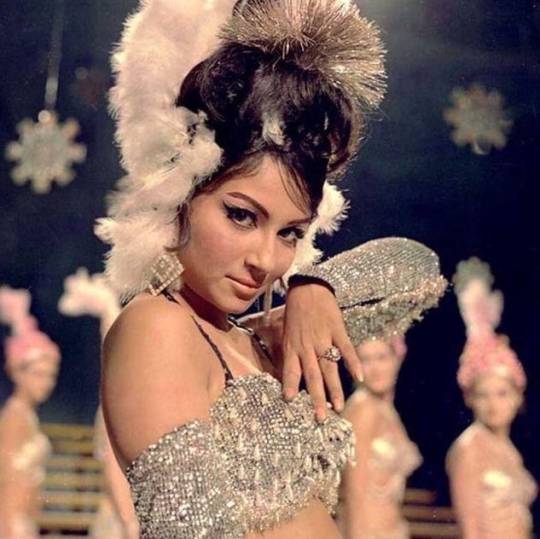

Propaganda
Sharmila Tagore (Apur Sansar, Kashmir ki Kali, An Evening in Paris)—She was adorable, an actual princess (through marriage), the first woman to wear a bikini in a Hindi film, and had, I would argue, the most iconic beehive hair in film history.
Françoise Dorleac (L'homme de Rio, Les Demoiselles de Rochefort)— One of the first actresses I had a crush on and still is. I want to cry every time I think about her because she is one of many with a tragic story but I just want to include her because she deserves it
This is round 2 of the tournament. All other polls in this bracket can be found here. Please reblog with further support of your beloved hot sexy vintage woman.
[additional propaganda submitted under the cut.]
Sharmila Tagore propaganda:



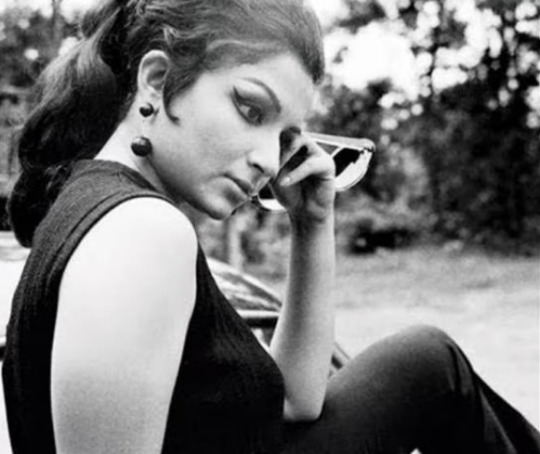
"One of the most well-known Bollywood actresses of all time!"
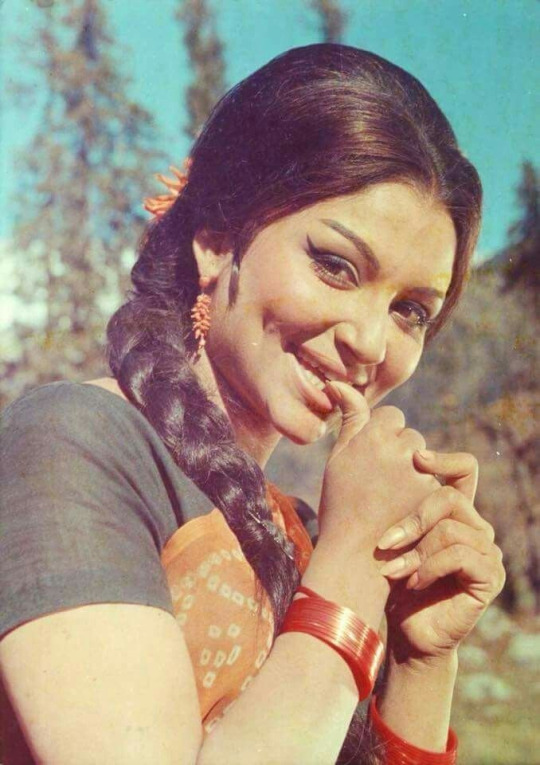
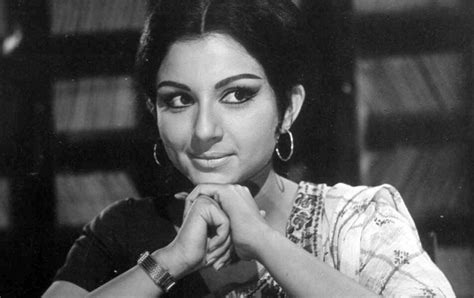
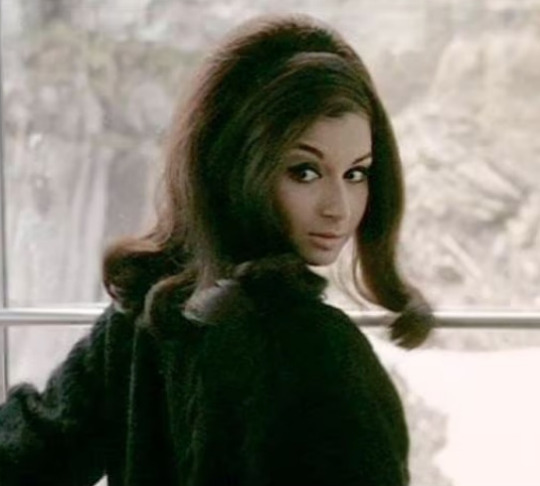
Françoise Dorleac:
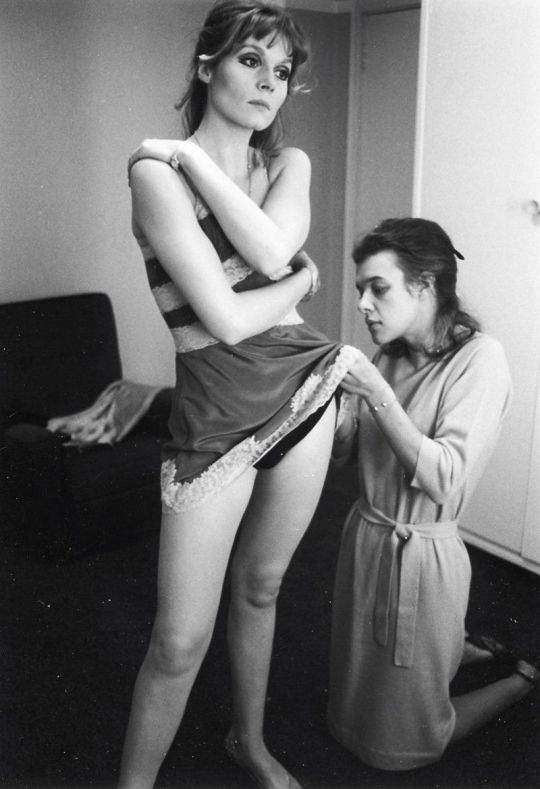
102 notes
·
View notes
Text

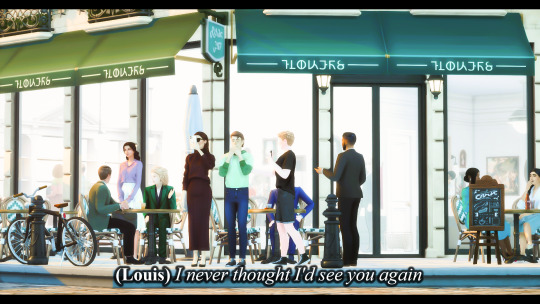
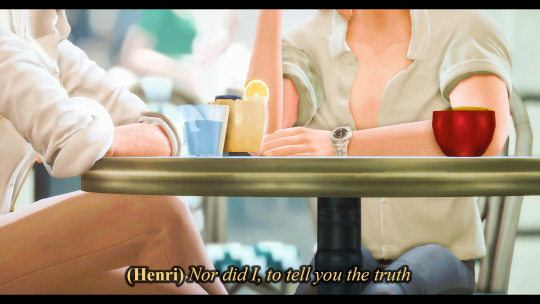
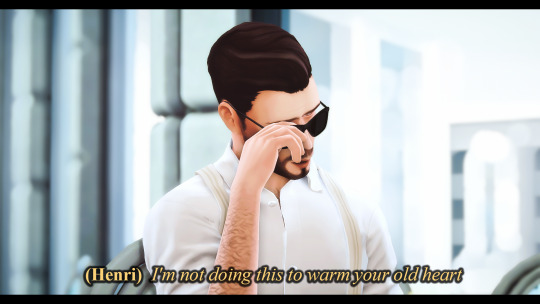
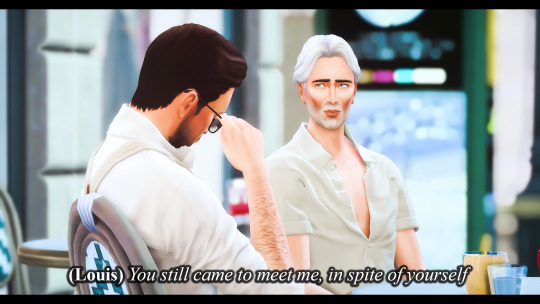
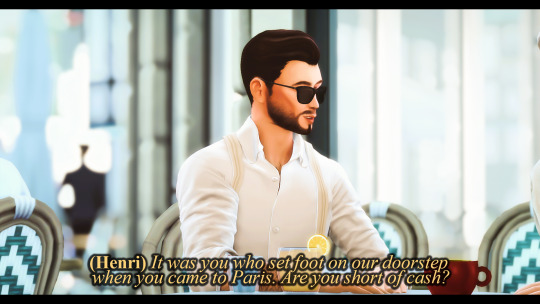
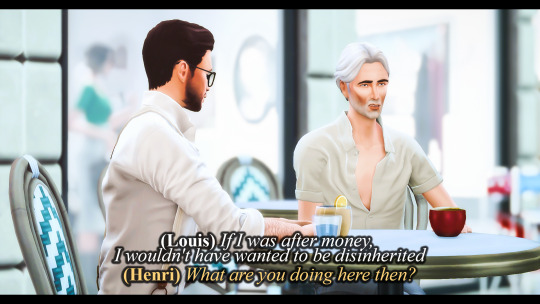
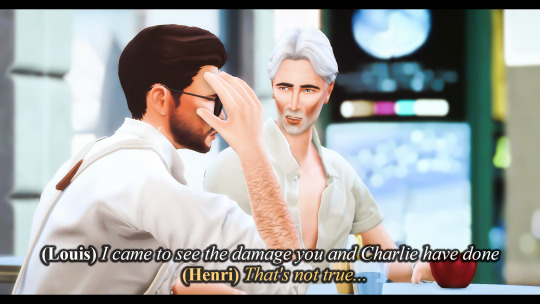
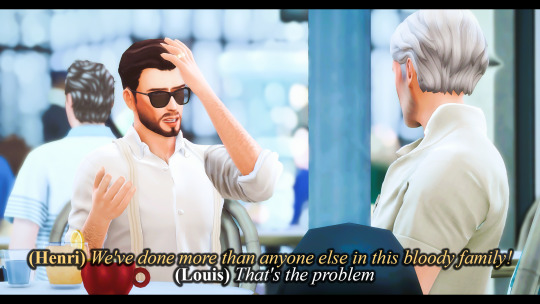
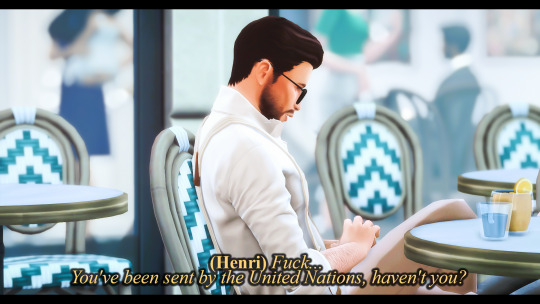
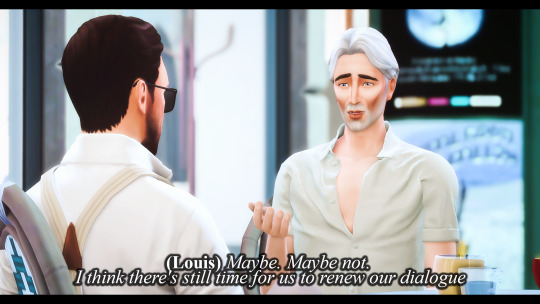
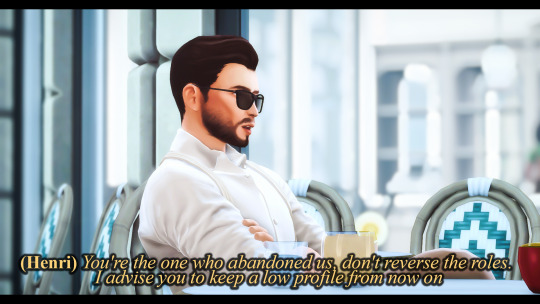
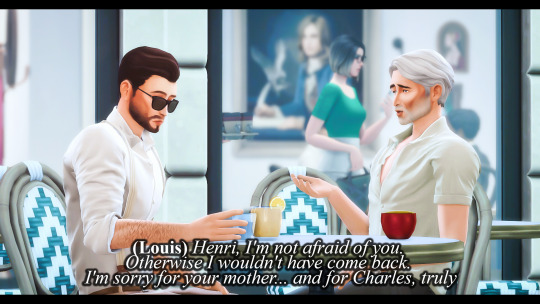
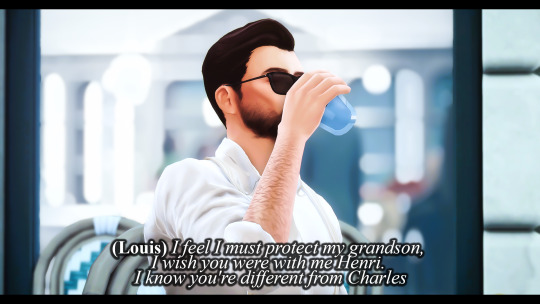
⚜ Le Cabinet Noir | Episode III, N°7 | Francesim, Paris, 26 Thermidor An 230
Imperial Prince Henri meets his father, Louis Simparte, incognito. They lost touch over 20 years ago, long before Francesim's empire was established. Henri hopes to reach an amicable agreement with his father, so that he no longer makes waves in French magazines and debates. As their exchange progresses, Henri wonders whether the old man has not been sent by the United Nations to assess whether there are human rights violations in Francesim, as part of a commission of inquiry. However, Louis Simparte did not reveal his intentions to his son, and tried to renew his relationship with him after the death of Charles (Napoleon IV, Henri's older brother).
Beginning ▬ Previous ▬ Next
⚜ Traduction française
Le prince impérial Henri rencontre incognito son père, Louis Simparte. Ils se sont perdus de vue il y a plus de 20 ans, bien avant l'établissement de l'empire de Francesim. Henri espère pouvoir trouver un accord à l'amiable avec son père, afin que ce dernier ne crée plus de vagues dans les magazines et les débats français. Au fur et à mesure de leur échange, Henri se demande si le vieil homme n'est pas envoyé par les Nations Unies pour, dans le cadre d'une commission d'enquête, estimer s'il y a des violations des Droits de l'Homme en Francesim. Cependant, Louis Simparte ne révèle pas ses intentions à son fils, et essayer de renouer avec lui après la mort de Charles (Napoléon IV, le grand frère d'Henri).
(Louis) Je ne pensais pas te revoir un jour.
(Henri) Moi non plus, pour te dire la vérité. Je ne fais pas ça pour réchauffer ton vieux cœur.
(Louis) Tu dis cela mais malgré tout, tu es venu à ma rencontre.
(Henri) C'est toi qui est venu à notre rencontre, en mettant les pieds à Paris. Qu'est-ce qu'il y a ? Tu es à court d'argent ?
(Louis) Si je courais après l'argent, je n'aurais pas voulu être déshérité.
(Henri) Que fais-tu là alors ?
(Louis) Je suis venu voir les dégâts que Charlie et toi avez fait
(Henri) C'est pas vrai...
(Henri) On a fait plus que n'importe qui dans cette famille de malheur !
(Louis) C'est bien le problème
(Henri) ... Putain, tu as été envoyé par les Nations Unies, c'est ça ?
(Louis) Peut-être, peut-être pas. Je pense que nous pouvons toujours renouer le dialogue.
(Henri) C'est toi qui nous a abandonné, n'inverse pas les rôles. Je te conseille de faire profil bas ici, maintenant
(Louis) Henri, je n'ai pas peur de toi. Sinon je ne serais pas revenu. Je suis désolé pour Charles et pour ta mère, sincèrement. J'ai le sentiment que je dois vous protéger désormais. J'espère pouvoir compter sur toi Henri, je sais que tu es différent de Charles.
#simparte#ts4#ts4 royal#royal simblr#sims 4 royal#sims 4 fr#sims 4#ts4 royalty#sims 4 royalty#sim : oldlouis#sim : henri#le cabinet noir#episode iii#sims 4 royal family#ts4 royal simblr#ts4 royal family#ts4 royals#royal sims
29 notes
·
View notes
Text
Hugo sexy election: round 3!

Rip la pieuvre, they couldn't handle your voluptuous power
Voting ends next Sunday night!
#pizza talk#les miserables#les mis#les miz#nddp#notre dame de paris#the hunchback of notre dame#hond#l'homme qui rit#the man who laughs#the grinning man musical#kinda#tgm#the grinning man#ninety three#quatre vingt treize#93#les travaillers de la mer#the toilers of the sea#hugo sexy election#victor hugo
184 notes
·
View notes
Note
Since you've read most of Victor Hugo's books, how would you rank them from best to worst, and why? I really want to know your thoughts. Always love to hear it <3
!!! THANK YOU THIS IS SO SWEET and also so hard but here we go!
Les Miserables
yes it's my favorite but I also do think it's the best! The most ambitious of his works story-structure and character/theme density and frankly? He absolutely lands it. I have been arguing with and about this book for over a decade now and I expect I will be doing so for the rest of my life, because it's worth it. I probably don't have to argue hard for it in top spot on the Les Miserables Webbed Site, though, so moving on:
Ninety Three /Quatre-vingt treize
Not my second favorite but honestly probably just as good as LM but in a different way? Much more compact and focused, and feels every bit of the influence of more recent political events in France at the time, but just as ambitious in terms of the arguments and themes it's trying to cover. The ending is something you can have eighty feelings about in an afternoon but it is always unforgettable. Deserves to be so much better known.
Toilers of the Sea /Les Travailleurs de la mer
My actual second favorite Hugo novel! A big Romanticist nature-focused love letter to the Channel Islands and to the sea! A mix of delightfully unreliable Nature Facts and Hugo's own observations about the place, that Nature-focus is always convincing either way with Hugo's descriptions. It's so very different from most of Hugo's later novels, but also *so* good, if you're willing to just sit back and enjoy the view . Gilliatt is a Forever Fave. Please more people read Toilers, it's a delight. And it has an Octopus Fight!
The Man Who Laughs /L'homme qui rit
Victor Hugo's Revenge on English History! I could feel my knowledge of actual English History Facts peeling away as I read this. Incredibly described scenes, iconic central characters, Ursus is one of the best-written characters of all time (though I have learned that some people have apparently never met a guy like this?? he is such a Type though!) . There's a wolf and the wolf is named Homo.
After Les Mis, some old Hugo fans were lamenting about how far he'd strayed since the days of Notre Dame , and I think The Man Who Laughs feels a lot like a return to that old , over-the-top Goth style of Hugo's,but stronger, in keeping with the way his writing had grown over time-- until the end, when everything kind of feels like it wraps up too abruptly. Which makes sense! Hugo was finishing it up while his wife Adéle was in her final illness, and it makes sense that it would show--but I think it does show, and keeps the novel from being quite all it could be.
Notre Dame de Paris
I know it's either Hugo's most famous or second-most famous novel, but I really do think it's not as solid as the others! Which isn't a roast on him, it's a good thing for an author to get better over time--but it still leaves this novel feeling kinda messy. I can see Hugo trying to do his signature move of pulling together multiple separate plot/themes into a triumphant grand finale, but he hasn't quite got the knack yet. Plus there's still a lot of elements here that feel like Hugo relying on tropes a bit (and horrible tropes at that, too) instead of entirely speaking with his own voice quite yet.
(also ohman. the Issues. but I'm trying to keep this post from being nine million screens long)
All of the above range from "absolute masterpiece" to "not an entire masterpiece but still iconic", and then there's Hugo's Early Stuff, so:
Bug Jargal - honestly it's not fair of me to even include this, it was a novel he wrote as a very young person, on a time-dare. If I'd written a Nano novel in high school it would have been SO bad. And this is bad! It's SO bad!! But you can still definitely tell it's Hugo by the way he makes sure to tell us, AFTER the story is over, that EVERYONE IN THE WHOLE BOOK DIED, EVERYONE, EVEN THE PETS. Stunning. Peak Romanticism XD (again though. THE ISSUES. whooof.)
Han d'Islande: Í have not even read this one. HUGO was down on this one later in life. I Dare Not XD (I probably will someday). But it has a polar bear and drinking seawater from skulls and inspired some very questionable behavior from the fans (attempting to drink seawater from skulls!) so I gotta acknowledge it!
Honorable Mention: the novelas
Not quite in the same group as the novels, but I think both Last Day of a Condemned Man and Claude Geaux are excellent, super-focused stories about the injustice of the prison system and the issue of capital punishment. Obviously they can't have the range of his novels, but that's not the point--they are much more direct statements on a single issue and they're really intense and effective in that!
This was fun! thank you for asking! And I'd love to hear your own thoughts on this , if you ever feel like writing them up:D
88 notes
·
View notes
Photo

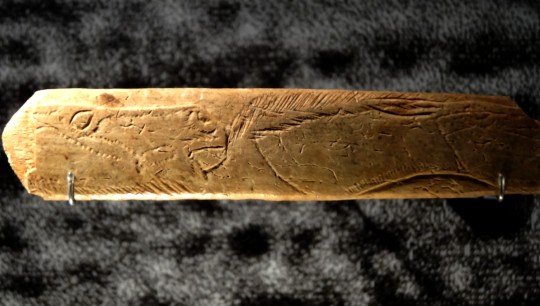
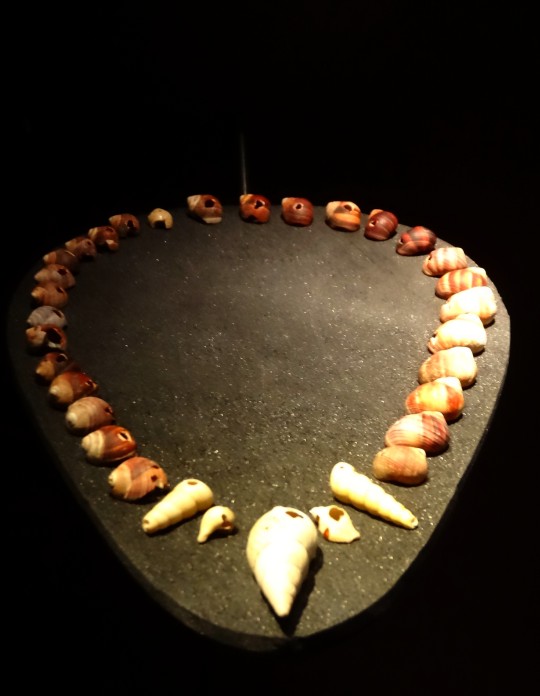
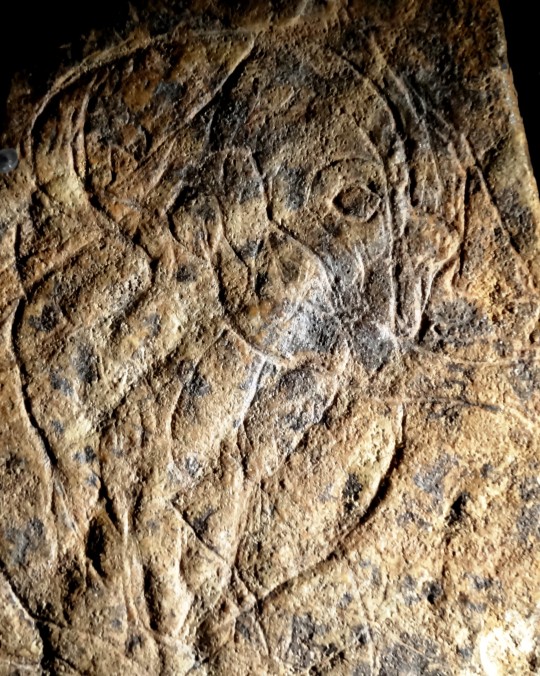


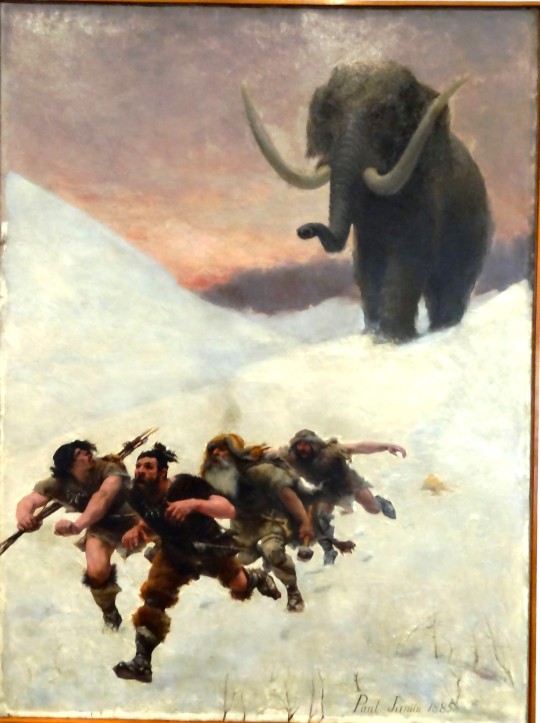
Je reviens à mon projet de présenter la plupart de mes 55000 photos (nouveau compte approximatif. On se rapproche du présent !).
2016. Une journée à Paris. Le Musée de l’Homme:
- la Dame du Cavillon - Menton, -30.000 ans
- côte d'herbivore gravée de têtes de chevaux - Les Eyzies (Dordogne)
- collier de littorines dit "de Cro-Magnon”, -28.000 ans
- Profil de Femme - grotte de la Marche, Vienne
- crânes d’animaux de période glaciaire (entre autres, Mammouth, Ours des Cavernes , Rhinocéros laineux...)
- reconstitution de faune glaciaire : Cheval de Prjevalski, chamois, blaireau,...
- Paul Jamin : “La Fuite devant le Mammouth” (le côté un peu ridicule de ces chasseurs chassés est-il voulu ?)
#souvenirs#paris#musée de l'homme#préhistoire#fossile#taxidermie#dame du cavillon#menton#bijou préhistorique#cheval#chevaux#cheval de prjevalski#les eyzies#dordogne#cro-magnon#littorine#grotte de la marche#crâne#squelette#mammouth#rhinocéros laineux#ours des cavernes#chamois#blaireau#paul jamin#homme préhistorique
13 notes
·
View notes
Text

“L'Homme à la Tête de Chou" bronze de Claude Lalanne (1968) placé initialement ans le jardin de la “Maison Gainsbourg” et présenté au Musée Gainsbourg, Saint-Germain-des-Prés, Paris, février 2024.
25 notes
·
View notes